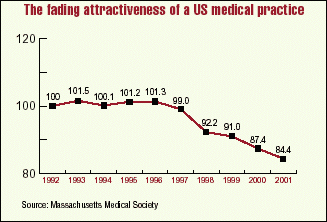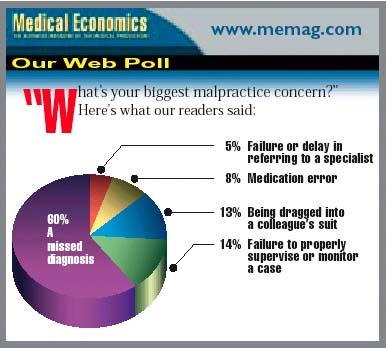Article
Practice Beat
Medical Privacy, Clinical Trials, Health Insurance, Medical Practice, Prevention Medicine, Our Web Poll
Practice Beat
Joan R. Rose
Medical Privacy: Kennedy: Bush's new rule is a "telemarketer's dream"
More than a dozen groups representing physicians and other providers have thrown their support behind the Bush administration's proposed changes to the Health Insurance Portability and Accountability Act's privacy rule. But Sen. Edward M. Kennedy (D-MA) has vowed to fight the elimination of the requirement that providers obtain patients' written consent before disclosing protected health information for such routine purposes as treatment, payment, and health care operations.
Supporters of the rule change contend that the prior consent requirement could pose obstacles to patient care by increasing waiting times and delaying treatment until the form is signed. Although Kennedy acknowledges that the requirement poses some "legitimate concerns," he says those exceptions can easily be addressed without gutting the whole rule. Moreover, he warns that the proposed rule change would open a "backdoor loophole" allowing companies to use private medical records to send mailings to a patient's workplace or home. Restoring the consent requirement is the only way to ensure that patients alone control this sensitive information, Kennedy says, and he plans to introduce legislation to do just that.
Health Insurance: California's crystal ball forecasts a worse-than-expected premium rise
More than 700 large and midsize companies polled last year by management consultants Hewitt Associates expected their health insurance costs to jump 13 to 14 percent annually over the next five years. But in Californialong a bellwether statepremiums are rising at nearly twice that rate. The California Public Employees' Retirement System (CalPERS), the state's largest purchaser of public employee health benefits, is looking at average rate hikes of about 25 percent for HMOs and 19 to 22 percent for the system's PPOs next year.
With the 2003 HMO package for about three-fourths of its 1.2 million health program enrollees projected to cost $458 million more than this year, the CalPERS board cut its HMO offerings from seven to five. But the health benefits service has managed to avoid changes in benefits, service areas, and copayments for office visits and prescription drugs.
In the past, CalPERS restrained costs by pitting HMOs against one another, but marketplace forces have made that strategy unworkable. "This is the toughest environment we've ever faced," says Rob Feckner, CalPERS Health Benefits Committee chairman. "The HMOs gave little ground in rate negotiations, and left us no room to maneuver."
Clinicial Trials: Are patients willing to be guinea pigs?
Four-fifths of the more than 2,000 adults polled nationwide by Harris Interactive believe it is "essential" (43 percent) or "very important" (40 percent) that "all new prescription drugs or other new treatments be tested on human beings in clinical trials before they are approved for general use." Nevertheless, a substantial number also believe that participation could put their health at risk.
For example, only one in three is "very confident" that he'll receive good medical care in a clinical trial, while two out of three speculate about whether they'll be treated as guinea pigs rather than patients. At least two-thirds question whether the risks are fully explained and wonder whether they'd suffer more than they would with standard treatment. And just one respondent in five is "very confident" that doctors and hospitals are involved for altruisticnot financialreasons.
Medical Practice: Doctors' misery index continues to worsen
After monitoring the challenges facing physicians over the past decade, the Massachusetts Medical Society recently released its MMS Index with indicators from US physician practices. The new report shows what anecdotal evidence has long suggested: Conditions in the medical practice workplace are rapidly deteriorating.
The index, based on nine factors such as physician supply, practice finances, and work environment, has declined 15.6 percentage points since 1992 (the base year), with most of the slide occurring in the past five years. Nearly three-fifths of the decline last year can be attributed to just one factor: the high cost of professional liability insurance.

Preventive Medicine: Doctors can save livesand keep billions of dollars from going up in smoke
It's been nearly 40 years since the first US Surgeon General's report on smoking and health was released. Since then, scientific evidence concerning the consequences of tobacco use has been mounting. Yet, despite overwhelming evidence of the harm smoking causes, tobacco use is still the leading preventable cause of death in the United States, according to the Centers for Disease Control and Prevention. Indeed, from 1995-1999, smoking caused more than 440,000 deaths a year, and took a tremendous economic toll as well.
Each pack of cigarettes sold in the United States costs the nation an estimated $7.18 in medical care costs and lost productivity, according to the CDC's report. Moreover, from 1995-1999, smoking accounted for more than $150 billion in annual health-related economic losses, including $81.9 billion in mortality-related productivity losses. In 1998 alone, excess medical expenses related to smoking totalled $75.5 billion.
Doctors who don't counsel patients on the merits of smoking cessation may be part of the problem. The US Surgeon General's 2000 report shows that even brief physician advice to quit smoking can double or quadruple normal quit rates, while a combination of behavioral counseling and pharmacological treatment can boost success up to 10 times.

The author is a Contributing Writer.
Joan Rose. Practice Beat. Medical Economics 2002;11:21.





